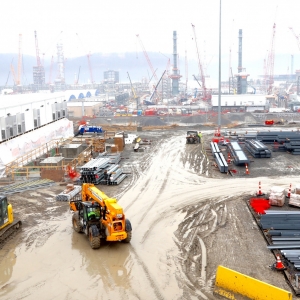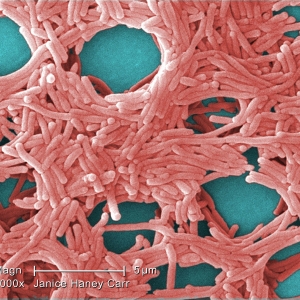The Steam, August 21, 2019: Wildfires Blaze in Drought-Hit Alaska
The Global Rundown
Wildfires strike parched areas of Alaska. The National Olympic Committee says they are confident that organizers of the 2020 Tokyo Olympics can fix lingering water quality issues. Drought cuts palm oil production in Indonesia. Residents of Newark, New Jersey, where lead is polluting some household drinking water, say that their water has tasted odd for years. California prepares to vote on a $1.3 billion safe drinking water act.
Latest WaterNews from Circle of Blue
West Virginia Bets Big on Plastics, and on Backing of Trump Administration — The state’s leaders want a federal loan guarantee to build a giant chemical storage plant that could cost as much as $10 billion. (This story was originally published on ProPublica.)
HotSpots H2O: Drought and Unrest Push Residents Out of Central America’s Dry Corridor — Residents of Central America’s Dry Corridor are at a crossroads: stay in the drought-stricken region, where food insecurity and violence are rampant, or migrate.
By The Numbers
659 Wildfires this year in Alaska, which have burned roughly 2.5 million acres. Parts of the state are experiencing the hottest and driest summers on record, boosting the likelihood of forest fires. Reuters
48-49 million tonnes Predicted output of Indonesian palm and palm kernel oil in 2019. Next year’s yield is expected to be lower, however, due to current drought conditions, which farmers say will likely hamper outputs in the first half of 2020. Reuters
Science, Studies, and Reports
On a three-day trip to Tokyo, Japan, the National Olympic Committee expressed confidence that the city will be able to address water quality and other issues prior to the Games, which begin on July 24, 2020. Over the weekend, the swimming portion of a paratriathlon was canceled after E.coli was detected in the water. In response, Games organizers say they plan to have triple-layer filtration screens installed by next summer. Reuters
On the Radar
Bottled water distribution is continuing in Newark, New Jersey, after testing found that filters distributed by the city were failing to eliminate high levels of lead from household drinking water. Many residents are expressing frustration over the situation, saying that their water has been “tasting funny for years,” and that the government ignored past warning signs about the lead contamination. The New York Times
California’s State Water Resources Control Board is set to authorize a $1.3 billion program to ensure safe and reliable drinking water for the state’s underserved residents. More than 1 million Californians do not have steady access to good quality water. If approved, the $1.3 billion will be dispersed over 10 years, and go toward projects that will improve water quality. Bloomberg Environment
Kayla Ritter is a recent graduate of Michigan State University, where she studied International Relations and Teaching English to Speakers of Other Languages. She is currently based in Manton, Michigan. Kayla enjoys running, writing, and traveling. Contact Kayla Ritter








Leave a Reply
Want to join the discussion?Feel free to contribute!